Mental Health Workers on Hunger Strike: A Union’s Fight for Patient Care and Dignity
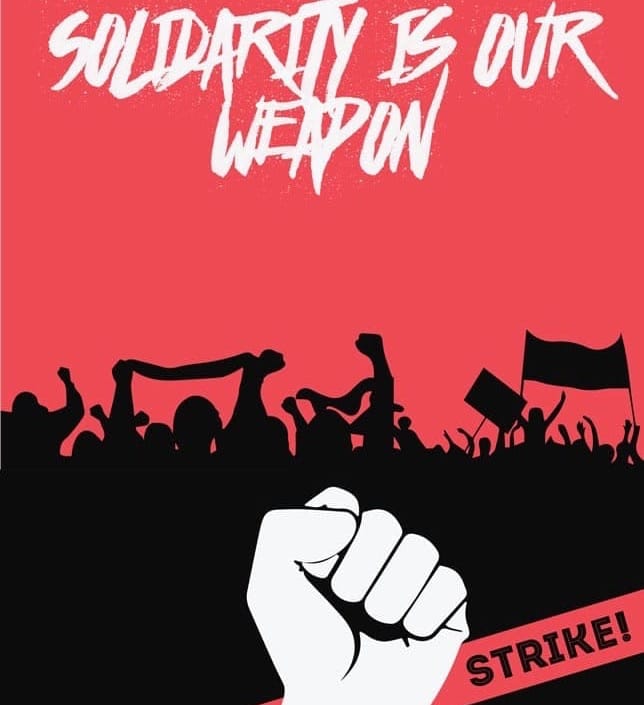
An Interview With Ana Vargas Garcia of National Union of Healthcare Workers
Great news update: The union and Kaiser reached a tentative agreement on 5/4 and by 5/7, union members voted to ratify it as a contract (by a significant majority in favor).
Gains were made in the top 3 priorities:
- secured a cash balance pension (+401k with 3% matching) for all new mental health workers that dont already have the traditional pension.
- secured ~20% increases in wages within the next 4 years (5.5% upon ratification, 5.5 % in October 2025, 5% in 2026, and 4% in 2027)
- and for “patient management time” - time that is blocked in workers schedules to attend to patient care responsibilities that can’t be done in session- secured 5 protected hours per week (meaning management cannot book into them without our permission) and 2 unprotected hours per week (management can book per patient need but we still have a say). That’s for full time staff and it’s prorated for part timers.
With the new contract, workers are due to be in the same negotiation cycle as Northern California so that is a big win ass well.
Ana Vargas Garcia, a Kaiser Permanente clinical social worker in Southern California, is among eight clinicians on a five-day hunger strike amid a six-month union-led strike. Key demands include fair pensions—denied to mental health staff hired after 2014—manageable workloads, and wage equity, as Southern California clinicians earn less than Northern counterparts for the same work.
Kaiser has dismissed concerns, hiring costly temps over negotiating, ignoring state fines for subpar care, and shaming strikers with an "emergency alert." But patients and the public are supporting them, refusing replacement therapists and rallying online.
For Ana, this is personal—she’s seen patients suffer due to Kaiser’s neglect. The hunger strike is a desperate plea to prioritize people over profits. She urges mental health professionals to join the fight for ethical care and fair labor, declaring: "This is about fixing a system that’s literally killing us."
Jeff Jones (Liberation Psychotherapy)
Thank you for doing this. I’m sure you're pretty busy. I will just jump in so as to not waste your time. Could you explain a little bit of who you are?
Ana Vargas Garcia
I am a licensed clinical social worker here in southern California and I work for Kaiser Permanente and our union, NUHW, the national united union of health care workers- sorry day two of not eating
We're reaching month six this week of our strike. We've been fighting for our patients to have better services. The services that they need that legally Kaiser is required to provide, and it's an ethical concern for us that we're not able to practice what we're trained to do in an ethical manner. So we're out here fighting for our patients and for better working conditions. We have social workers, psych nurses, psychologists, medical social workers, marriage and family therapists, they're all part of our union, so it's all mental health workers and addiction medicine as well.
Jeff Jones (Liberation Psychotherapy)
How long has the union been with Kaiser Permanente?
Ana Vargas Garcia
That's a really good question that I'm actually going to reserve for one of my colleagues, Adrianna, who two of our fasters are part of the bargaining team and they've been with Kaiser for a longer time. I've been with Kaiser just for two years. They can speak better to the history of our union with Kaiser because it has been very rocky and we do believe that they are trying to make an example of us, for the other three unions. There's some other unions whose contract is going to be up this year and, if we're successful, all of it is successful.
At the core of how Kaiser was founded was with workers. I believe they were factory workers, and the big bosses wanted them to be healthy because they noticed that when the workers were healthy, there was better production, right?
That was a big part of how Kaiser started and they pride themselves in being very supportive of labor. There are several unions. There's a pharmacist union, there's... nursing unit, UNAC, the medical staff that's monitoring the hunger strikers this week, they're all volunteers from either our union directly or a sibling union of Kaiser.
Jeff Jones (Liberation Psychotherapy)
What led to the current strike in October?
Ana Vargas Garcia
There's three main things that we have communicated to Kaiser since day one that were very important to our members.
One of them is pensions. All of Kaiser employees from the clerical staff that check people into appointments, to management, to the person that wheels you over to get an x-ray done; They all have pensions at Kaiser. Except for a fraction of Southern California mental health workers.
Especially with the economy, the way that it has been, a pension is very different from a 401k plan.
So Kaiser, I want to say it's 2014, the last time the contract was up, they took away the pension for anyone that's coming up, that came in afterwards (after 2014), and we're fighting to get it back.
So that's a big part of why it's so hard because they would love to take the pension away from everybody else.
We have a lot of support from the other unions because Kaiser is nervous. Now that it's been six months they have already spent over hundred million dollars paying temporary workers. That money could have been used for pensions, for all of us that don't have a pension, for the entirety of our tenure at Kaiser. It's only a small fraction of us that don't have a pension. It's not about money. It's about power.
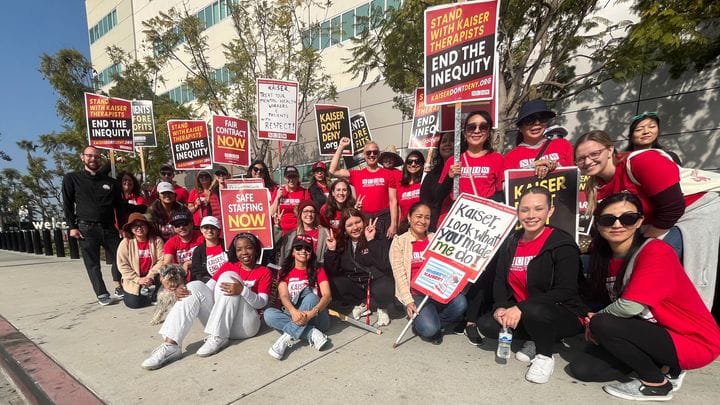
Another big thing, I would say one of the most important ones, is needing time for us to be able to provide the care that our patients require. Most of us at Kaiser have to see patients back to back to back to back. I work for a program that has 30 minute sessions and we can see anywhere from eight to 16 patients in a day. That's a recipe to burn anyone out.
It's not healthy or sustainable for providers and it's not ethical. We don't have a moment to take a breather and make sure we cross our t’s and dot our i’s and give our patients what they deserve.
Jeff Jones (Liberation Psychotherapy)
How do you have time to get your notes done?
Ana Vargas Garcia
"She was in her 90s and the week beforehand she had lost her husband of 64 years, a lifetime together. And her grief was so raw, so recent. I said to myself, I can't possibly have a 20 minute session with her. That is cruel. That is abrasive. We're hurting the patient more when we do that."
Kaiser says that they give us 10 minutes in between appointments to do them. That would mean, specifically for the program that I work for, that we do 20 minute sessions and that's unacceptable. I always think about my patients with grief that come in. I think of one patient in particular. She was in her 90s and the week beforehand she had lost her husband of 64 years, a lifetime together. And her grief was so raw, so recent. I said to myself, I can't possibly have a 20 minute session with her. That is cruel. That is abrasive. We're hurting the patient more when we do that.
Kaiser has something called, what we call here in Southern California, “patient management times.” It’s time totally blocked off that we use to do mandated reports, to coordinate services for someone, to send the resources that we promise, to call patients back. We're asking for seven hours per week for a full-timer. It's what our counterparts in Northern California already have. They refuse to do that.
Right now our contracts are supposed to give us four hours, but management can book into it whenever they want. So they overbook us purposely. So what do we do? We end up booking into that time and Kaiser counts on us, being ethical clinicians, to stay over at the end of our day to do the things that we're required to do by law. We all overwork ourselves. It's completely unsustainable.
I'll say Kaiser hires well. They do attract really good clinicians, but they can't keep them. Most leave before their first year is up. They do and I don't blame them. It's incredibly difficult to stay here and it doesn't even make financial sense for them. But it’s the patient that's most important. If they've built a relationship with a therapist it's not interchangeable with somebody else.
Jeff Jones (Liberation Psychotherapy)
This is a human endeavor, that human connection and relationship, is what we do.
Ana Vargas Garcia
Right. Now they're saying ‘oh everything's fine, we're giving the best care, our patients are getting the care that they need’ and they're hiring temporary workers paying them over $13,000 for five days.

Jeff Jones (Liberation Psychotherapy)
Instead of “temporary workers” is it better to just call them scab workers?
Ana Vargas Garcia
Yes, yes. I didn't want to use that word because sometimes people take it as very derogatory but they’re scabs! They're undermining their own profession.
They're undermining themselves and doing patients a disservice in the long term. Our patients understand us. They come here to our picket line with us. They say, I'm gonna wait for you, Ana. I don't wanna see another (therapist), I'm gonna wait for you. And we want them to get the care that they need. And I tell them, you don't need to but they want to, because they've built a relationship. And so what patients are getting offered right now is a different therapist every other week.

Jeff Jones (Liberation Psychotherapy)
And one that's only there for the money.
Ana Vargas Garcia
Yeah, yeah.
I'll send you a link to a press conference that our union held a while ago. It was the patients that were so brave. They were so brave. They spoke up about their own personal stories.
For some patients, this is a matter of life and death. Literally one of them said, ‘I don't know how I'm alive. I keep advocating for myself and Kaiser still keeps on failing me.’ They want to deny it, but patients have literally lost their life at their hand.
So at that critical time we need to be able to do our work, to care for patients, that's still patient care, but it's outside of the session. We can't do it in session.
"They say it's different geographic areas and when they say that I hear it's different demographics. In Southern California there are more brown and black people and we have more patients and 40% less staff."
The third thing is disparity in salaries. When we ask them about our salaries, because there was a wage freeze for our department for several years, we ask them for equity in our salaries. They say, well, we can't offer you the same as Northern California, we can't offer you better salaries, because we already provide you with good salaries for the market. They keep on comparing Northern California and Southern California- we're not asking for anything revolutionary, we're asking for things that they already give other employees. They say it's different geographic areas and when they say that I hear it's different demographics. In Southern California there are more brown and black people and we have more patients and 40% less staff. Kaiser is a company that has the funds, actually has the resources to be a leader in the field.
They keep on mentioning this lack of mental health care workers. Well we know what can keep them. We know what can retain them. Give them a pension. Give them better working conditions. Otherwise people get their license, do their own private practice and patients end up getting priced out of therapy. Let clinicians do their private practice because it's not sustainable for a clinician.
So those are our top three demands that we wanted to discuss at negotiation, Kaiser refused to talk about it. Our union had a vote. There's about, I want to say, 2,400 to 2,700 members in our union, over 84% of us voted to have an open-ended strike over these issues.
They're that important to us. They did a survey less than two weeks ago and 85% of us are still committed to those top three demands. We're very united on this front.
Kaiser has completely refused to talk about these things. They keep on saying ‘we've given you a comprehensive proposal’ and their ‘comprehensive proposal’ is rejecting all of our proposals. They want to do what they’re currently doing because it works for them, because even though patients are not getting better, patients have already paid their premium. They already have the patient's money. So they don't care whether the patient gets the service they need or not.
They count on people getting lost in the abyss of the system and giving up so that they don't have to provide for them. Part of the reason why myself and seven of my colleagues are doing this five-day hunger strike, is to keep them accountable.
We've had a lot of clergy support as well and there was a reverend that spoke yesterday. The way that I think of it is as this hunger strike is a way to remind Kaiser of our humanity. It's workers and it's patients, that are not just some pawns, we're human. It is a life and death thing- mental health work saves lives all the time.

Their main strategies have been delaying, bargaining and trying to union bust. Thankfully we’ve stayed very united. For several months they were non-responsive. Our negotiators from our union were like ‘we're available 24/7, you say the day we’ll be there.’ It wasn't until our elected officials, a super majority of our state assembly got together and drafted a letter of support for us and governor Newsom called our union that they got in contact with us. The way that I look at it is they wanted to tell the media ‘this is unnecessary look, we have dates on the table.’ They had no intention to actually bargain in good faith because they weren't willing to talk about our top three demands. So our bargaining team voted to suspend mediation until they were actually ready to bargain in good faith. It wasn't until over the weekend when we announced our hunger strike that Kaiser again reached out to us and scheduled dates. So we have one or two next week. They're all at the end of April. But there are several days in between. That's what I mean they're trying to delay and most people cannot stay out of work without pay for six months. They can't. It's really hard. So unfortunately people that are very committed to these issues have been forced to go back because they need to pay their bills.
It's really interesting, today there was an HR woman that came out as we were doing interviews with the media, trying to intimidate us and she was the same woman that back in November blocked our striking members from receiving a food box donation. So she came out now and we're at a hunger strike and so we say they're literally trying to starve us.
They’re saying that we give up, we're not actually committed to this, but we are. I have colleagues that have given up their apartments because they haven't been able to make rent and moved out of state because this is so important to them. We shouldn't have to be making those choices. Patients shouldn't have to be dealing with this. We have so many patients that say ‘I need mental health services, but I'm not asking for it right now because I don't want to cross the picket line.’ We want our patients to get their appointments, we tell them, please ask for it, do it, because Kaiser is still legally and ethically obligated to provide that and they're not.
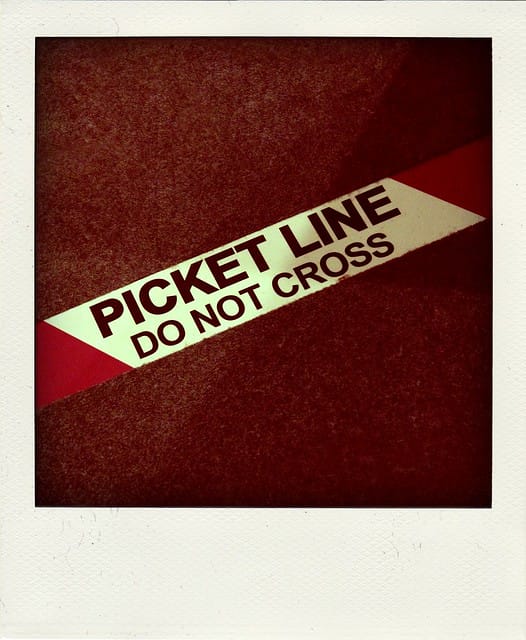
Jeff Jones (Liberation Psychotherapy)
It's not them crossing the line. It's the scabs who are crossing
Ana Vargas Garcia
Yes. We've been sharing that message as much as we can. We have had hundreds of patients share their story of how their services were delayed or denied. We have a research department that has gathered these and this is not new. I've only been with Kaiser for two years, but these issues are not new. They've been going on for several years and two years ago in 2023, Kaiser was fined by state regulators over $200 million, the biggest fine in state history, for violating the law when it comes to providing mental health services to its members. Just last week the state regulators published their report that found they have still not fixed 19 of the 20 violations they were cited for. Because they don't care. They don't care. The only way that we can hold them accountable is if we stand up. You know, I miss my patients. I love what I do! But that would be complicit in the system if I were to go back right now as things stand.
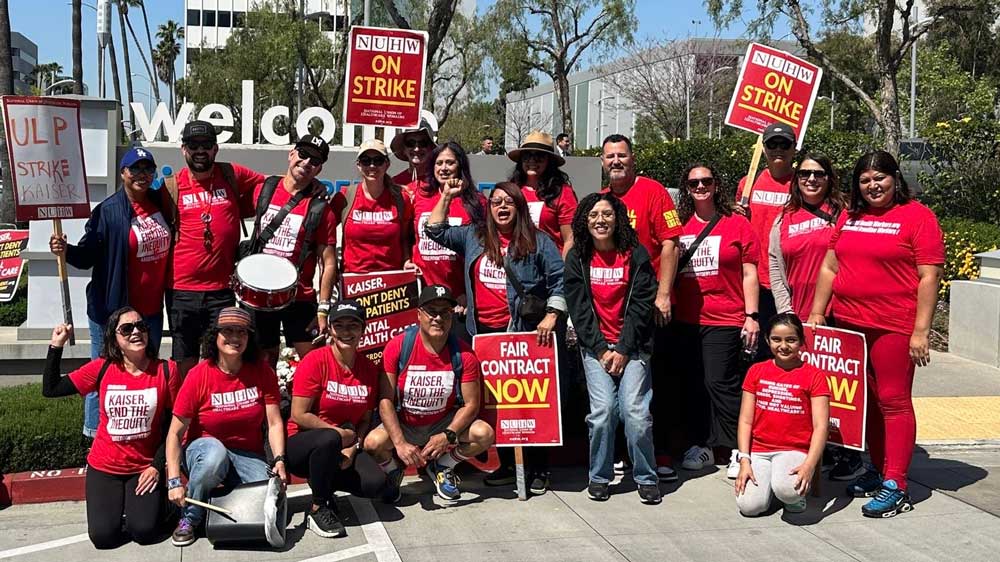
Jeff Jones (Liberation Psychotherapy)
Yeah, because as you were saying earlier, it hurts all workers. It would hurt the rest of the union. It would hurt the Northern Union, but it would also hurt the rest of us across the US, across the world.
Ana Vargas Garcia
Yeah. And, these issues are not specific to Kaiser. This is going on in other places too. But what I see as one of the biggest differences is that we're unionized. A lot of other mental health clinics and mental health clinicians don't have that. We're doing this, yes, for patients here at Kaiser, but this is part of leading a change in the field.
Jeff Jones (Liberation Psychotherapy)
I agree as the mental health field is largely not unionized. It's mostly nonunion or independent contractors. Most mental health workers don’t want to be independent contractors. As we need benefits.
Ana Vargas Garcia
Yeah, exactly. One of our union leaders, he often says, this is the beginning of a bigger movement that's been in the making for many years. Our hope is to one day, for there not to be a separation between mental health and health. For it just to be called health and that can encompass mental health. It's much bigger than all of us.
I think about what happened with the health care CEO a while back. It shows that people are fed up with our healthcare system as a business.
Jeff Jones (Liberation Psychotherapy)
Yeah, it's literally killing us.
Ana Vargas Garcia
Literally killing us, yes. That's why I'm participating in the hunger strike. I want to know that I've done everything I can and it's a moral issue for me. I also do it for my colleagues because I'm young. I'm 32. I don't have kids. I have a partner that is financially supporting me. I can do this now. It's painful. It's really painful, but I can. We have people that are clinicians that are out, that already have pensions, but they're fighting for me.
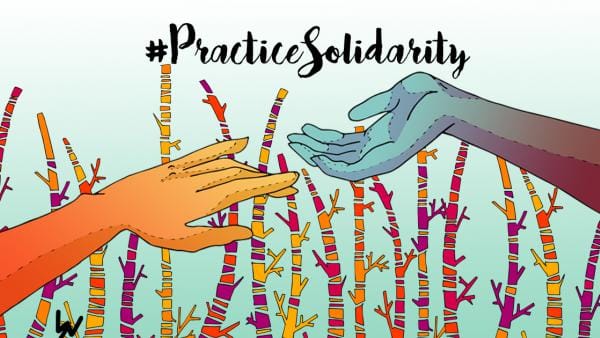
Jeff Jones (Liberation Psychotherapy)
That's what solidarity is about.
Ana Vargas Garcia
They have a child (two union parents also on the hunger strike), you know, and she says we take it day by day. We take it day by day, but the only way we can do it is with a lot of community support. That's the only way that's been possible.
Jeff Jones (Liberation Psychotherapy)
Are you seeing it? The community support
Ana Vargas Garcia
I know the patients know what’s going on. I see it more as like we have to hit Kaiser where it matters for them, their reputation, their bottom line, for them to care. I think I'm seeing that these past two days. They sent out yesterday, which was the start of our hunger strike, they sent out an emergency alert. I thought this was so funny- funny and not funny. They sent out an emergency alert to all the workers here where we're picketing about our hunger strike.
That they were so disappointed in us that the union was making us do this and promoting this very unhealthy thing- What is unhealthy is patients waiting months to get an appointment. They said they were committed to providing the best care even for hunger strikers. They said that they were going to be supportive but we haven't seen anyone come and check on us. No, it was all for the media.
They are getting bothered and I mean it's about time, it's six months, it's just way too long.
They could prevent the hunger strikes if they wanted to today.
Jeff Jones (Liberation Psychotherapy)
How can mental health workers, international mental health workers, or people who care show solidarity in this hunger strike and the strike in general?
Ana Vargas Garcia
One of the things that I have heard from union members and colleagues that have been with Kaiser for a longer time is that social media has been a very unifying force this time around. There's been limited strikes in the past, but this has been the most successful because Kaiser, I mean, were a huge region, they rely on separating us and so what social media did is it connected all of us.
I have colleagues, now mentors from San Diego, I can connect with and we're several miles away! That wouldn't have happened without social media and that's the way that we're reaching out to the public.
We don't have millions of dollars to take an ad out in front of the L.A. Times, like Kaiser has done. We don't have that kind of money, but we can share our experiences. Patients have been sharing their stories. Kaiser does care about its reputation so sharing about what's going on is really helpful. It's hard because there's a lot of media competition right now. There's awful things happening in the world. There is. I would say it's only indicative of how much of a need there is for a professional in the field.
Jeff Jones (Liberation Psychotherapy)
We can help patients/clients get out of an acute crisis, but I can't tell tell them that everything's going to be okay in the larger picture. That there will be justice.
Ana Vargas Garcia
Yes, yes. When we had the fires here, not too long ago, we had striking members that were affected by the fires themselves. We had one striking member who lost her home. We wanted to help, right? We wanted to help our community. So what we did, because we wanted to continue with the strike, is that we volunteered as civilians on our own time at shelters, in so many different ways, with other organizations to support in that process. And we still are. But Kaiser has failed its Southern California community. There's tons of members I can think of- I'm like, oh my God, how are they? I know they lived there. I know that they were affected by them.
So they're failing patients with fatal consequences. They really are.
I was prepared to enter this week of the hunger strike, knowing it was going to be really challenging physically and emotionally. I was in my head preparing as much as I could for that, but what has been lovely, I don't even want to say at the price, but it was a price, is how much love and support we have received. I feel protected. I feel supported. I feel like the only reason why I can do this is because we have community.
Our members are showing up. They're driving miles and miles so that they can be here and drive us from our picket line back to the church where we're staying. It means so much. A lot of other people wanted to be part of the hunger strike. Actually, it was a member-led decision. A couple of us were like, you know what? We're doing this. The union leaders were like, wait a second, we want to make sure you're safe. So let us help you. They're the ones that are actually helping us and organized the medical staff to guide us. We had to check in with our doctors, had to get blood work done, all had to get medically cleared. There were people that, in that process, their doctors were like, it'd be too risky for you. So there were people that wanted to do it, but we want people to be safe as much as possible. So only the eight of us. It's a big sacrifice. We can't work our side hustles this week.
Jeff Jones (Liberation Psychotherapy)
I can imagine one of the issues is to show that we're not numbers in your ledger but flesh and blood.
I'm kind of making a joke, but this is our ‘meat sack,’ that is showing you that we're real human beings. That is the power of going through this hunger strike.
Ana Vargas Garcia
Yeah. You know, folks, they thank me. They say, ‘thank you for your sacrifice’ and I understand what they mean. To me, it doesn't feel like a sacrifice. The reason why it doesn't feel like a sacrifice is I think of all my patients that needed someone. They needed someone and they're the ones that are paying for the negligence that Kaiser has caused.
Jeff Jones (Liberation Psychotherapy)
This capitalism is killing us.
Ana Vargas Garcia
It is. Can't agree enough. Yeah.
Jeff Jones (Liberation Psychotherapy)
Any group, maybe the union, but is there any group that people should know about where they can give mutual aid or donations?
Ana Vargas Garcia
Yes. We have a hardship bond, so social media is a way that people out of state can help but mutual aid is another really really really important one. We're very low on funds and five dollars makes a difference for people.
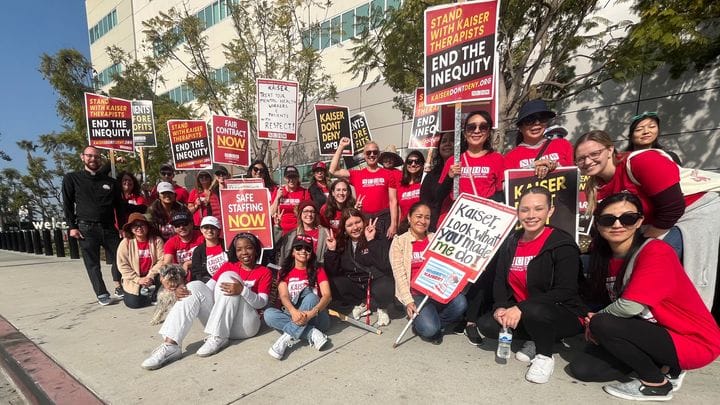
Jeff Jones (Liberation Psychotherapy)
My heart is with you. I'm so glad that you are doing it. This is for everybody. The old saying, an injury to one is an injury to all.
Ana Vargas Garcia
The hotel where we're the bargaining sessions were being held, the hospitality workers were unionized and the cleaning staff came to talk to us and they were like, ‘keep going, keep going because people are tired of being mistreated, people are tired of being exploited and when we support each other, that's how we thrive.’
Ana Vargas Garcia
Thanks so much. It was a great meeting you.
